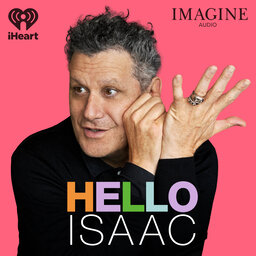Comedy Icon, Margaret Cho
Isaac Mizrahi talks to Margaret Cho about facial bukkake, dreaming small, why he considers her a sage and more.
Follow Hello Isaac on @helloisaacpodcast on Instagram and TikTok, Isaac @imisaacmizrahi on Instagram and TikTok and Margaret Cho on Instagram @margaret_cho.
In 1 playlist(s)
Hello Isaac with Isaac Mizrahi
Isaac Mizrahi is an expert - at almost everything! He’s an iconic fashion designer, actor, singer, …Social links
Follow podcast
Recent clips

Emmy-Winning Actor and Director, Pamela Adlon
51:37

Interior Designer & TV Host, Jeremiah Brent
49:51

Podcast Host & Crooked Media Co-Founder, Jon Lovett
50:53
 Hello Isaac with Isaac Mizrahi
Hello Isaac with Isaac Mizrahi